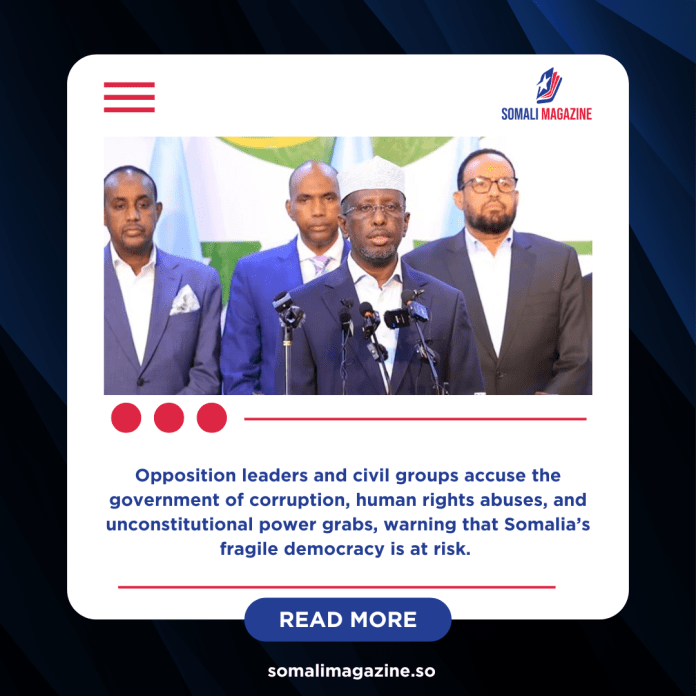Facebook Twitter (X) Instagram Somali Magazine - People's Magazine
Somalia’s political tensions deepened on Tuesday after the Somalia Salvation Forum, joined by lawmakers from both houses of parliament, announced plans to file lawsuits against President Hassan Sheikh Mohamud, his government, and senior officials. The group accused the administration of violating the constitution, corruption, and human rights abuses, particularly the forced eviction of poor families. The lawsuits are expected to be filed both in Somali courts and in international jurisdictions.
The Forum’s statement said the country faces a political and constitutional crisis that threatens its stability, security, and long-term future. At the center of the dispute is the government’s handling of constitutional reforms. Critics argue that amendments passed in March 2024 unfairly expanded presidential powers, weakened parliament, and undermined Somalia’s fragile federal system. Though a deal last month rolled back some of those changes—restoring parliament’s authority to confirm or dismiss a prime minister and easing rules for political parties—opposition leaders remain deeply divided over the government’s intentions.
Several high-profile politicians, including former Prime Minister Omar Abdirashid Ali Sharmarke and former parliamentary speakers Sharif Hassan Sheikh Adan and Mohamed Mursal, signed the electoral framework alongside the government. However, other influential figures, such as Wadajir Party leader Abdirahman Abdishakur Warsame, rejected the agreement, saying the president’s proposed electoral timeline was unrealistic given Somalia’s current instability.
The Forum also accused the government of deliberately delaying state elections in Galmudug, Hirshabelle, and South West, where mandates expired between 2022 and 2024. It argued that without a credible electoral framework, Somalia risks chaos as the country heads toward its scheduled 2026 transition. President Mohamud’s mandate is due to expire on May 15, 2026, and opposition groups have repeatedly warned against any attempt to extend it. In a recent interview with the BBC, Mohamud denied plans to stay beyond his term and defended his government’s constitutional changes, insisting that Somalia must push forward with one-person, one-vote elections.
Beyond electoral disputes, the Forum’s lawsuit will focus on allegations of corruption and human rights violations. It accused the government of selling public land to private interests and using security forces to forcibly evict families in Mogadishu and other regions. The statement said these actions represent a clear abuse of power and breach both Somali and international law, particularly when women and children are expelled without protection or alternatives. Earlier this month, the Forum claimed the administration was prioritizing land deals while neglecting the fight against Al-Shabaab.
The group also warned that political infighting and mismanagement have weakened Somalia’s ability to combat the militant group. “We urge the president and government to end disputes and focus on defeating Al-Shabaab,” the statement read. Critics argue that leadership failures and constant political wrangling have distracted from the country’s most urgent security threats.
In its latest call to action, the Forum urged Somalis inside and outside the country to unite against corruption and abuses through peaceful demonstrations. It said the people have the legal right to defend themselves against government overreach and that only their collective voice can safeguard Somalia’s survival and democratic future.
The press release was endorsed by a wide range of groups, including the National Rescue Forum, members of parliament, civil society organizations, academics, traditional elders, women, youth, diaspora communities, and business leaders. Together, they say they will continue to challenge the government both legally and politically until reforms are made and accountability is ensured.

